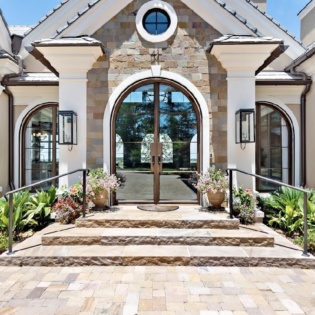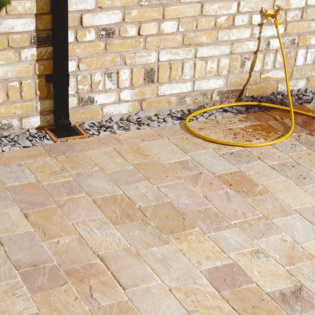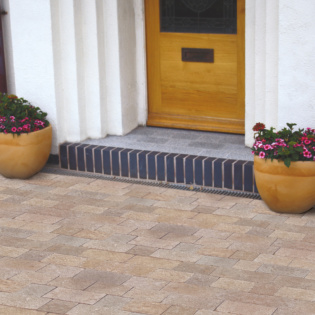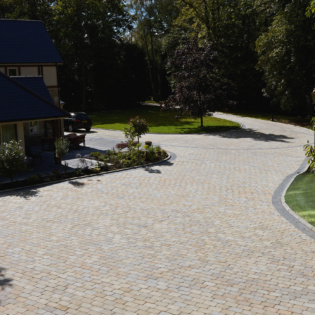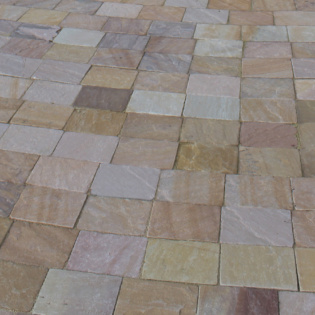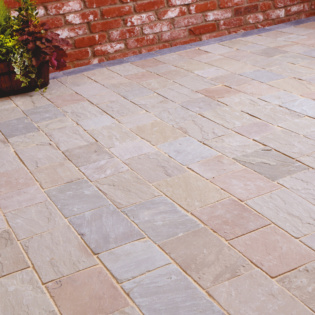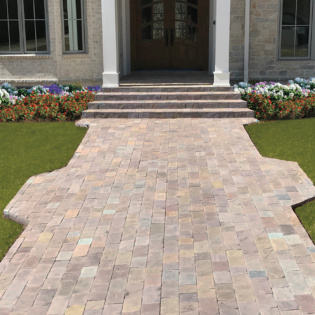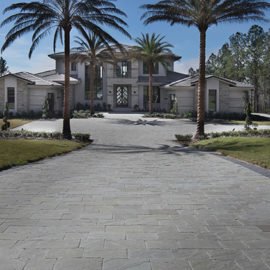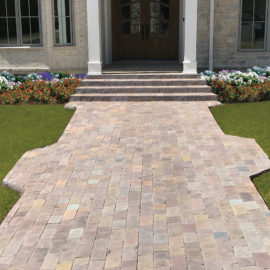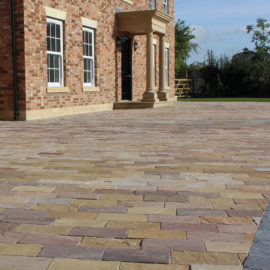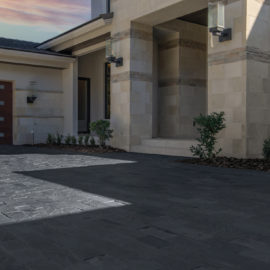De Terra Natural Stone Driveway Paver Collection
WHY CHOOSE DE TERRA DRIVEWAY PAVERS
Built for Strength, Designed for Style—No Compromises.
- High-Strength Performance: ASTM-tested sandstone and limestone pavers deliver compressive strength far beyond most concrete pavers for driveways.
- Weather Resistant Stone: Built to withstand frost, road salts, and seasonal temperature swings without the cracking or surface wear common to concrete.
- Colorfast Stone Pavers: Natural hues remain vibrant year after year, while many concrete pavers fade and expose aggregate.
- Low Maintenance Pavers: Designed for minimal upkeep and long-term reliability, reducing the need for repairs or replacements
- Versatile Applications: Rated for heavy-duty driveway use but equally ideal for patios, walkways, and landscape designs requiring a premium look.
- Familiar Installation: Laid using the same methods as concrete pavers, giving contractors a straightforward process with a superior finished product.
Design Versatility
Available in both warm sandstone and cool limestone tones, De Terra makes it easy to complement any home exterior. The small-format paver style provides classic traction and timeless appeal, while precise calibration ensures tight joint lines and a refined driveway surface.
Engineered for Longevity
With ASTM-tested compressive strength, De Terra stone driveway pavers offer a driveway solution that won’t crack, fade, or wear down the way many concrete pavers do. The result is a long-term investment that stays strong and beautiful year after year.
Sustainable Sourcing
All De Terra driveway pavers are responsibly quarried, offering an eco-friendly paving solution without sacrificing strength, performance, or style.
Weather-Resistant Durability
Made to stand up to the elements year after year.
-
Freeze-thaw resilience: Dense composition helps prevent cracking or spalling in cold climates.
-
Fade resistance: Retains natural beauty even in harsh sun exposure.
-
Proven longevity: Outlasts typical concrete pavers in both structure and appearance.
Salt resistance: Stands up to de-icing products without surface damage.
Paver Driveway vs Concrete
Why more homeowners are choosing natural stone.
Increased property value: Enhances curb appeal and adds lasting resale value to your home.
-
Appearance: Stone offers richer, more authentic color and texture.
-
Maintenance: Easier to replace individual stones if needed.
-
Longevity: Maintains beauty and strength for decades with minimal upkeep.
FAQs About Driveway Pavers
What paver thickness is best for driveways?
Most concrete driveway pavers are about 2⅜" thick and around 8,000 PSI. De Terra natural stone driveway pavers are offered in 1¼" and 2" thicknesses and test over 15,000 PSI. The 1¼" option is rated for residential driveways; 2" is ideal for heavier or commercial use. The 3-piece pattern helps distribute load for long-term performance.
Are natural stone driveway pavers better than concrete?
For driveways, yes. Concrete pavers commonly fade, crack, or expose aggregate over time. De Terra sandstone and limestone are denser, colorfast, easier to repair, and deliver long-term value and curb appeal without the patchwork look of concrete repairs.
Is travertine good for driveway pavers?
Generally no. Travertine is more porous with natural voids and is better suited to patios or pool decks, not vehicle loads. De Terra uses dense Indian sandstone and limestone designed for driveway traffic, freeze–thaw, and de-icing salts.
How soon can I drive on De Terra pavers?
Immediately after compaction and jointing. There’s no curing time like concrete. Install, compact, joint, and the driveway is ready for use.
Do natural stone driveway pavers crack in winter or hot climates?
De Terra’s dense sandstone and limestone handle freeze–thaw cycles, heat, and road salts without the spalling and surface wear common to concrete. Natural color stays stable year after year.
Are De Terra driveway pavers slippery?
No. The textured faces and tumbled or processed edges provide good traction, making them a safe choice for driveways, patios, and pool decks.
Can I install De Terra myself if I’ve laid concrete pavers?
If you’ve installed concrete pavers before, you can install De Terra. The process is the same: prepare the base, add bedding sand, lay the pattern, compact, and joint. For large driveways, hiring a pro can save time and ensure top results.
Are natural stone driveway pavers more expensive than concrete?
Upfront, usually yes (moderately). Over the life of the driveway, De Terra’s durability, ease of repair, and color integrity often reduce maintenance and replacement costs, delivering stronger lifetime value than concrete.
What’s the best pattern for driveway pavers?
A 3-piece modular pattern (like De Terra’s) helps disperse weight, minimizes repeating joints, and creates a timeless, high-end look. It’s also efficient for contractors to lay.
Do De Terra driveway pavers fade like concrete?
Natural stone has through-body color; there’s no pigment layer to wear off and no aggregate exposure like concrete. Expect stable, natural color with routine care.
Helpful Links
Disclaimer: Please be aware that natural stone can vary in color and texture, making each piece unique. To maintain the beauty and integrity of your stone, avoid using acid or acid-containing products, as they can lead to discoloration and potential damage.
